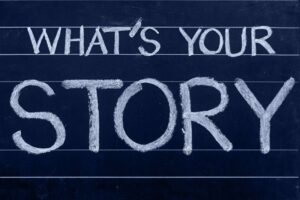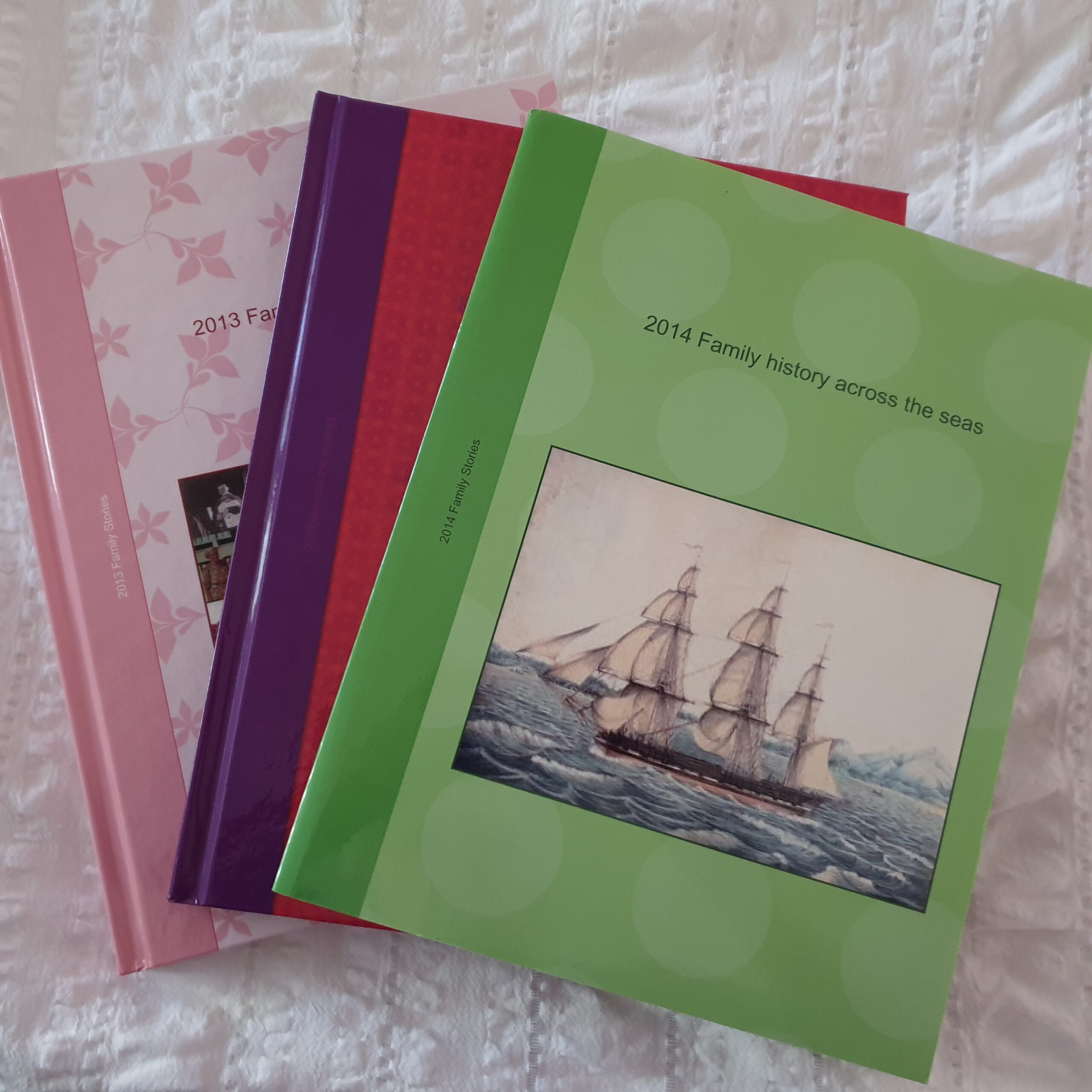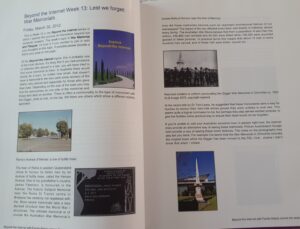Tell Your Family Stories.
With the tsunami of genealogical data available online it’s tempting to just keep adding more and more facts and branches to your family tree. It’s also tempting to ignore the context of the data – to not look beyond the page you’ve landed on. Do you assess what you’re seeing, whether it’s a transcription or an image of the original document? All this data adds to what you know about your families but does it tell their stories?
I’m sure you’ve all seen the meme that does the rounds about gravestones stating birth and death dates, but that there’s so much more to an individual life between those dates. We understand that our own lives are not just about dates, rather the events and their circumstances, and what impact they had on us and our immediate or extended families.

Image from Pixabay.
For these reasons I’d encourage you to tell your families’ stories (and your own). Write them up, go beyond the basic facts. I was fortunate when I started my research over 30 years ago, that two women who I’d contacted via snail mail had both placed their families within a narrative context. Perhaps that’s what formed my own approach, combined with a natural inclination to write.
WHY WRITE?
There are many reasons why writing up your stories is worthwhile for yourself, your research, and other family members.
It gives you the opportunity to place events in context – was it raining on the day your ancestors were married? What impact did it have when they were declared bankrupt? Is there any evidence or stories about how they coped with illness or natural disasters or the tragedy of losing a child or children? Were they “typical” of the place where they lived or did they differ in some particular way? These nuances add the pattern to your family’s historical quilt.
You can present your research findings, and perhaps the path you took to locate the information and how you assessed its merits. This not only helps you, but also gives your readers insights into your process, and how they might approach a similar problem. I know that with my own blog I now find that I’m going back to something I’ve written over the years, to revisit what I discovered, and my thinking about it at the time. It doesn’t mean that you can’t revisit or revise earlier thinking – you can add to what you’ve learned before, modify it if need be, and explain why and what’s changed.
Story writing reveals the gaps in your research. You’d be surprised how often the process of writing up highlights something you just haven’t followed up, or need to explore.

This image is from Pixabay.
A story has more impact than a bunch of names and dates, though if I had a dollar for every time I’ve been asked “how far back have you gone?”, I could pay for all my subscriptions! You can focus on particular elements and give them more detail with your story line. Most people like a good story.
WHO ARE YOU WRITING FOR?
The theory of writing is to do so with a focus on your audience. Yes, it needs to be interesting, but it also needs to satisfy a need for you, whether it’s to tell the story in and of itself, or to lay out your discoveries.

Image ID: 284498147 purchased from Shutterstock.
Mostly my focus is on the content of the story I want to tell, rather than whether Person A or B might be interested. This is for two reasons. Firstly, it’s my story of my research. Secondly, my target audience is very much my children and grandchildren. Even if they don’t get round to reading the stories for some time, I live in hope the stories will still be there.
WHERE DO YOU WRITE?
You can choose to write publicly or privately, via a blog, or in a document that you print off at Officeworks (or similar). Remember always to consider copyright and privacy considerations – they do apply even if you’re “only” printing 10 documents “just for family”. In your exclusively private documents you can write warts and all details, but again, you have to consider these key issues if you’re sharing any of it with others.
Blogging is a great way to put your stories in the public domain. It has several advantages:
- Sharing your research journey, discoveries and stories.
- Gaining a support group who can provide feedback or guidance, or “just” friendship…I’ve lost count of how many friends I’ve made through blogging.
- Sharing the stories with family – extended and immediate – the stories can make for great “cousin bait”
- Your blog may be archived in Pandora with Trove and hopefully be available long into the future. Just imagine yet-unborn descendants reading your words in decades to come.
- You can choose to make it public (available to anyone online) or private (just for family you invite).
- You can have your blog posts printed out into a book (Book2Print is an example)

Photo and blogs by Pauleen Cass.
WHAT’S YOUR WRITING STYLE?
My personal view is that your story writing should be true to your “voice”. You can “speak” informally or offer a more formal, perhaps academic or journalistic style. You can even change the tone depending on the topic you’re writing about, or an ancestor you knew, rather than someone you’ve never met. Footnotes help your readers follow your research path (and you, in case you forget). Some people subscribe to the thought that says short stories are best, I personally want to tell the story with the detail I want to include. Remember, you can add more than one “chapter” to the story if it’s a complex one.

Photo and blogs by Pauleen Cass
“But I can’t write”, many will say. You’re not aiming for Booker Prize stories, you just want to tell your family’s story…tell it how you want, based on what you’ve discovered. Use the thesaurus, grammar and spell checkers in word processing programs if you’re not sure of these things.
WHERE DO YOU START?
You’ve got lots of stories in your head, where do you start? You don’t have to start by thinking about “War and Peace”. You can chew off small bites using memes that do the rounds on sites like Geneabloggers Tribe.
Some memes to kickstart your writing:
- 52 Ancestors in 52 weeks
- Sepia Saturday
- Anzac Day and Remembrance Day – Down Under themes

Author’s image from Shutterstock
JUST DO IT
As with so many tasks, procrastination can be tempting, but just leaping in and putting fingers to keyboard, or pen to paper, is the only way to get going. I encourage you to take the writing journey – I’m confident you won’t regret it, and when family members show their appreciation for the stories you’ve told, you’ll feel an added glow of satisfaction from your journey.

Great advice Pauleen. You’ve made me think of when I first started researching. All I was interested in was names dates and how far back I can go. Until I started to get to know my ancestors. Since then my research has mostly been about their stories.
There is so much great advice in your blog Pauleen, thanks so much for these hints. Yes, writing your story certainly does highlight where you have gaps in your family history. Yes, it has more impact than a chart of bare dates and places. Yes, there are several advantages, especially in the family members who you never knew existed – cousin bait indeed! Lastly your writing style does evolve through the process.
Hello blogging friend! I am so glad you wrote about why you write and audience. I think if I thought about my audience too much, I would go mad and probably never put finger to keyboard. Of course, it is important to consider why your audience might be tuning in to your blog e.g. looking for hints on methodology. But ultimately I have to be excited enough about my topic to write – in truth probably more for myself than anyone else. The benefits, as you say, are that you see the holes in your research or challenge yourself to find new angles on a story. And yes I carry that burning torch of hope that some of my descendants might be interested one day.Thanks for reflecting on why we do what we do.
Thank you very much Pauline. I have joined a group whilst in this lockdown and we are writing each fortnight with a scenario in mind. I know what I want to say but putting it down on paper and making it sound interesting to the person who will read it, that is my problem. But here goes.